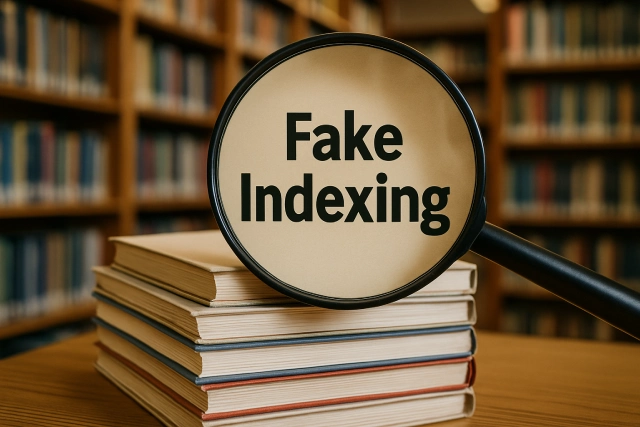Summary: More than ever, researchers are the target of fake journals that purport to be indexed by WOSJ. You may prevent unethical academic writing, identify misleading claims, and learn how to check journal indexing using our guide. We provide guidance on how to safeguard your work, explain warning signs, and provide examples of how to use the WOSJ Master List.
Fake journals that claim to be able to identify WOSJ indexes. Avoid unethical academic publishing traps, verify journals, and spot fake impact factor claims.
Want to ensure your research gets published seamlessly? Our team of experts can help you every step of the way. Contact us now for personalized support!

Dr. Arjun Mehra
qualified specialists
How to Identify Fake Journals Claiming WOSJ Indexing
Any researcher would surely feel lost in the labyrinth of journals for good research. But, beyond those, fake impact factor claims,, WOSJ listings.
They look official. They do everything in a rush. They claim to have a high impact factor. But they’re all sham. You stand to lose your paper, money, and reputation.
The sort of thing you will find on webofsciencejournals.org, for example. It sounds legit, but, spoiler alert, it is not a part of the actual WOSJ. And you’d be surprised just how many fall for these.
In this guide, we shall learn to identify false journals claiming to be indexed by the WOSJ database and how to spot bogus journals posing as WOSJ-indexed and how to proceed otherwise. Let’s get started.
What Is WOSJ and Why Does It Matter in Academic Publishing
WOSJ (WoS) is owned by Clarivate Analytics and is one of the most renowned indexing systems in academic publishing. Journals listed under WOSJ have undergone a rigorous editorial and peer-review quality test, making them a reliable source for high-quality research.
WOSJ-indexed journals fall under different collections:
SCIE (Science Citation Index Expanded)
SSCI (Social Sciences Citation Index)
AHCI (Arts and Humanities Citation Index)
ESCI (Emerging Sources Citation Index)
Each of these has their own respective selection criteria. Indexing is a difficult process; and that’s exactly why some journals fake it.

Your Path to Top Journals
Warning Signs of Fake Journals Claiming WOSJ Indexing
It takes a trained eye to spot a fake journal. Here are some red flags to warn you — from suspicious editorial boards to journal indexing fraud, where journals falsely claim to be listed in reputable databases to appear legitimate.
Bogus Claims of Impact Factor
Real impact factors are only derived from Clarivate’s Journal Citation Reports (JCR).
Predatory journals make up numbers or reference “SJIF,” “GIF,” or “Cosmos Impact Factor,” all of which do not exist.
If it sounds too good or strange, always verify it on https://jcr.clarivate.com.
Generic “Indexed in WOSJ” Claims
Actual journals mention their specific index: SCIE, SSCI, AHCI, or ESCI.
Fake ones simply toss around the term “indexed in WOSJ” without supporting it.
Misleading Websites (such as webofsciencejournals.org)
Correct. Sites like webofsciencejournals.org attempt to mimic being affiliated with Clarivate. But they’re not.
They copy keywords, exact logos, and corporate-sounding language. But always check the domain; the original one is mjl.clarivate.com.
Unrealistic Timelines
48-hour publication? Same-day acceptance?
That’s not peer review. That’s a fast food publication, and it will damage your academic credibility.
Suspicious Editorial Boards
Fake journals often have:
Editorial boards with no institutional email addresses
Non-existent researchers (Google the names!)
Copy profiles of real academics copied without permission
Want to ensure your research gets published seamlessly? Our team of experts can help you every step of the way. Contact us now for personalized support!

Dr. Arjun Mehra
qualified specialists
How to Verify a Journal’s Indexing Status in WOSJ
Here is how to conduct a journal authenticity check, step by step:
Use the WOSJ Master Journal List
Go to the WOSJ Master List: https://mjl.clarivate.com
What you can search by:
Journal title
ISSN
Publisher
When you have found it:
Check if it’s part of the Core Collection (SCIE, SSCI, AHCI, ESCI)
Mark as “active.” Some are dropped for low quality.
If it’s not here, it’s not indexed in WOSJ; no matter what it claims.
Check the Journal’s Website and Editorial Board
Examine more closely what the journal claims on its website. Use this handy comparison table:
| Feature | What to Look For | Red Flags |
| About Us | Transparent scope, editorial policy, and indexing | Vague claims, no publisher listed |
| Editorial Board | Real names + affiliations | Fake names, no details |
| Peer Review | Detailed procedures and a timeline review | No review process mentioned |
| Impact Factor | Links to JCR | Global or Universal metrics |
| Submission Email | Professional domain | Gmail, Yahoo, etc |
Additionally, look up the journal using PubMed, Scopus, or Google Scholar. One should be suspicious of a journal that is not listed in any reliable database.
Search for Journal Metrics and ISSN Verification
Check the Impact Factor at https://jcr.clarivate.com to learn more.
Use the ISSN database at https://portal.issn.org to confirm the ISSN.
As most predatory journals have instances where they openly steal ISSNs from legitimate ones, be sure the ISSN on the journal’s page is theirs.
Expert Advice: A journal is probably fraudulent if it displays a legitimate ISSN but is not listed in Clarivate’s MJL.
Steps to Avoid Predatory and Fake Academic Journals
Make use of this checklist before turning in your work:
- Look through the Master Journal List on the WOSJ
- Verify the JCR’s Impact Factor.
- Verify the publisher and the ISSN registration.
- Verify if members of the editorial board are active on institutional or LinkedIn websites.
- Avoid submitting your work to journals that guarantee quick publication.
- Check the Reddit or ResearchGate forums and Google the terms “predatory” or “fake” next to the journal.
- To help you stay on course, use lists such as Beall’s List (archived), but never use them as your ultimate guide.
- Steer clear of aggregator websites with a large number of obscure publications, such as webofsciencejournals.org.
Look for Unrealistic Publication Timelines and Fees
Some of these are phrases commonly employed by unethical academic publishing platforms:
- Claim to accept papers within 1-2 days
- Offer low or discounted APCs to rush you.
- Promise publication.
- Use phrases like “Only 2 places left in the next issue!” (very sleazy marketing).
- No true WoS-indexed journal behaves in that manner. Science is slow.
Want to ensure your research gets published seamlessly? Our team of experts can help you every step of the way. Contact us now for personalized support!

Dr. Arjun Mehra
qualified specialists
Bonus: Phrases Often Used by Fake Journals
Beware of suspicious phrases: Scammers would entice any unsuspecting user with promises that sound too good to be true. So, be wary of terms like “guaranteed rankings,” “exclusive partnerships with Google,” or “priority submission.”
These are usually red flags and are false claims of indexing where unscrupulous services imply that your content will be indexed or ranked through illegitimate avenues. So always verify the authenticity of such offers.
“Indexed in all top research databases, including WOSJ”
“Global impact factor: 10.211”
“Editor-in-Chief: Dr. John Smith” (no information available)
“Get published in 72 hours!”
International WOSJ says it is recognized, but it is not
Final Thoughts
In a nutshell, for you to protect your work and reputation, it is very important to be able to recognize false claims of an impact factor with WOSJ indexing. Such scams thrive on ambiguity, deceptive metrics, and unethical scholarly publishing.
If ever you have a journal in hand that does not feel right, don’t be in a hurry. Take 5 minutes to conduct a journal authenticity test. Refer to the WOSJ Master List, confirm the impact factor, and see if it’s an ISSN. And please, do not fall prey to websites like webofsciencejournals.org. Your work merits a genuine, revered forum. Remain wise, publish safe.


